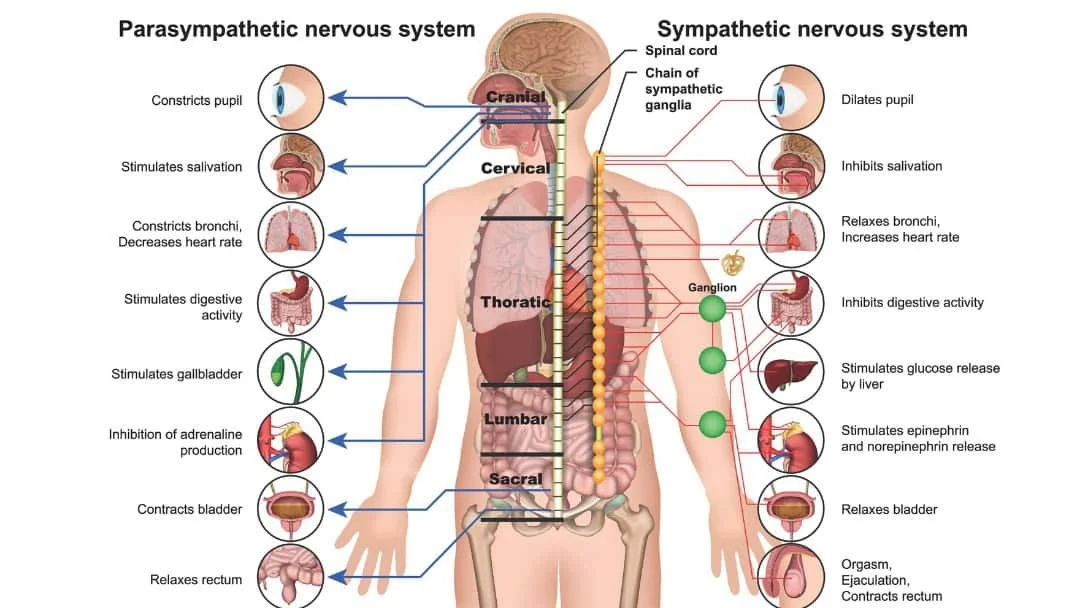Regulate Your Nervous System for Better Gut, Hormone, and Energy Balance
Have you ever felt like you’re doing everything right — you eat clean, try to sleep well, move your body, and still end up feeling anxious, tired, bloated, or just off?
The missing link might not be what you’re doing — but how your nervous system is functioning.
When your body is stuck in “fight or flight,” digestion slows down, hormones misfire, and your energy tanks. This is called nervous system dysregulation, and it’s one of the most overlooked causes of fatigue, gut issues, PMS, inflammation, and chronic stress.
The good news? You can absolutely re-train and support your nervous system naturally — with simple tools, foods, and habits that create real, lasting calm from the inside out.
What Is Nervous System Dysregulation?
Your nervous system has two main parts:
Sympathetic (“fight or flight”) – activated by stress, deadlines, worry, inflammation.
Parasympathetic (“rest and digest”) – supports digestion, hormone balance, detox, repair, and deep rest.
When life keeps you in a constant sympathetic state — through emotional stress, overwork, poor sleep, or even gut inflammation — your body ‘forgets’ how to shift back into rest mode.
That’s nervous system dysregulation: your body gets stuck in survival gear.
You may not even realize it’s happening, but it can quietly show up as:
Digestive issues (constipation, bloating, nausea, IBS)
Fatigue or “wired but tired” energy
Hormonal symptoms (PMS, irregular cycles, anxiety around your period)
Trouble sleeping
Feeling detached, anxious, or easily overwhelmed
How the Nervous System Affects Gut + Hormone Health
Your vagus nerve acts like a highway between your brain, gut, and hormones.
When your nervous system is calm, your vagus nerve sends strong signals to stimulate digestion, enzyme release, and bowel movement rhythm (called the Migrating Motor Complex).
When stress is constant, vagal tone weakens — slowing digestion, bile flow, and detox.
This can lead to:
Constipation or sluggish bowels
Gut dysbiosis (overgrowth of harmful bacteria)
Hormonal imbalances from poor liver clearance
Inflammation and skin issues
Low mood, anxiety, or brain fog
Basically, your body can’t heal or digest properly until it feels safe.
Signs You Might Be Stuck in Survival Mode:
You wake up tired even after sleep
You feel “on edge” or irritable often
You crave sugar, caffeine, or salt to get through the day
You’re constipated or bloated
You feel disconnected or emotionally flat
You feel overwhelmed often and easily
Your period symptoms feel worse under stress
If this sounds familiar, your nervous system may need some gentle re-training.
Foundational Tools to Regulate Your Nervous System
Let’s bring it back to the basics with small, doable shifts that send powerful “I’m safe” messages to your body.
1. Rest & Recovery
Deep breathing — try 5-minute “box breathing” (inhale 4, hold 4, exhale 4, hold 4).
Body scans or grounding — sit or lie down and feel your breath move from head to toe.
Non-sleep deep rest (NSDR) or guided relaxation before bed can rewire your stress response.
2. Movement & Nature
Gentle movement like walking, yoga, or stretching helps discharge built-up stress.
Daily sunlight exposure supports your circadian rhythm and serotonin production.
Try a short walk outside after meals — it’s grounding and improves digestion.
3. Gut-Friendly Nutrition
Eat real, anti-inflammatory foods: colorful veggies, lean protein, good fats (olive oil, avocados, fish).
Include polyphenols from berries, pomegranate, and green tea for brain and gut health.
Get enough magnesium, B vitamins, and omega-3s — key nutrients for nervous system repair.
Avoid excess caffeine, alcohol, and ultra-processed foods that overstimulate your adrenals.
4. Music, Sound & the Vagus Nerve
Humming, singing, chanting, or listening to soothing music can stimulate the vagus nerve.
Pay attention to the frequency and lyrics — choose songs that calm, inspire, or uplift you instead of aggressive or sad ones.
Even 5 minutes of humming or toning each day can improve vagal tone and digestion.
5. Emotional & Sensory Regulation
Limit screen time — especially before bed.
Create a calm environment (soft lighting, cozy textures, diffused essential oils).
Spend time in silence or with calming sounds (rain, waves, birdsong).
Journaling, therapy, or creative outlets help release emotional tension stored in the body.
6. Gentle Herbal & Nutrient Support
(Always check with your practitioner, especially with autoimmune conditions like scleroderma.)
Magnesium glycinate — relaxes the nervous system and muscles.
L-theanine — promotes calm focus without drowsiness.
Chamomile, lemon balm, or passionflower teas — natural nervines to settle the mind.
Adaptogens like ashwagandha or holy basil — help your body adapt to stress (start low and slow).
A Simple Daily Nervous System Reset
Try this 5-minute reset once or twice a day:
Sit comfortably and take 3 deep belly breaths.
Hum softly on your exhale for 30 seconds.
Place one hand on your heart and one on your belly. Feel them rise and fall together.
Step outside, close your eyes, and take in the sunlight for 1 minute.
Say quietly: “I am safe. My body can rest.”
This small ritual retrains your brain and body to recognize safety, which is one foundation of all healing.
When to Get Extra Support
If you’ve tried lifestyle changes and still struggle with chronic fatigue, gut issues, or hormonal imbalances, it may be time to get personalized help.
Working with a functional practitioner can help uncover deeper root causes like:
Gut infections (SIBO, Candida, parasites)
Nutrient deficiencies
Hormone or thyroid imbalances
Nervous system trauma or dysautonomia
The key is to work gently and consistently — not overwhelm your system with too many interventions at once.
References
Panagiotis Tsintavis, “Nervous System Dysregulation and How to Fix It.” (2023)
Stephen Porges, Polyvagal Theory (2011)
Harvard Health Publishing: “The Science of Stress and How It Affects Your Body” (2022)
National Institutes of Health: “Vagus Nerve Stimulation and Inflammation Modulation” (2021)


